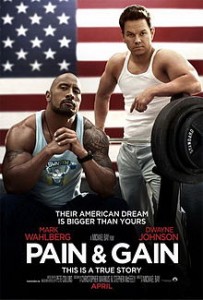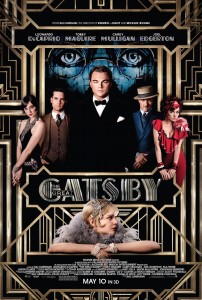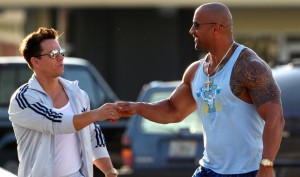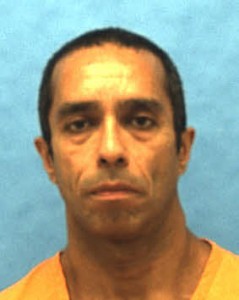
“Unfortunately, based on a true story,” we are warned as this film opens. In case we forget, or, more likely, in case we assume the usual Hollywood embellishments, we are reminded, when things get really bizarre and really, really, really disturbing, that it is, indeed, still true.
Director Michael Bay is known for big movies with big explosions, big special effects, and big, big budgets, including “Armageddon” and the Transformers series. So “Pain & Gain,” a passion project he planned for seven years with only a $40 million budget, is his version of a quirky little indie. Quirky, it is, and his feeling for the material, the too-bizarre-to-be-fictional story of three body builders who got involved with kidnapping and murder is palpable. Bay’s ability to give the audience the same sense of connection to the story is less effective.
Daniel Lugo (Mark Wahlberg, who will be on screen in Bay’s next blockbuster, the fourth installment of the Transformers series) is a body builder who believes in the American Dream. No, not the dream of freedom and democracy; the dream of getting rich without earning it. With two pumped-up compadres, the just out-of-the-clink born-again Paul Doyle (Dwayne “The Rock” Johnson) and steroid-injecting Adrian Doorbal (Anthony Mackie), they create a sort of Dumbfellas posse so they can kidnap a prosperous South American immigrant named Victor Kershaw (Tony Shaloub, playing a composite character based in part on Florida businessman Marc Schiller ) and torture him until he signs over all of his assets to them. “I’ve watched a lot of movies, Paul,” Lugo says with assurance. “I know what I’m doing.” He figures if they dress up like Ninjas, Kershaw will never know that he is being robbed by the people who spot him at the gym. But after it all goes down, Kershaw immediately, and literally, smells something funny.
) and torture him until he signs over all of his assets to them. “I’ve watched a lot of movies, Paul,” Lugo says with assurance. “I know what I’m doing.” He figures if they dress up like Ninjas, Kershaw will never know that he is being robbed by the people who spot him at the gym. But after it all goes down, Kershaw immediately, and literally, smells something funny.
The movie is darker than the marketing makes it seem, with very graphic scenes of torture and dismemberment, but it does include some very funny moments as our hapless anti-heroes continually overestimate their own abilities and underestimate those around them. All of the performances are excellent, but Ed Harris steals the film as a former cop-turned detective and Emily Rutherford is a stand-out as his wife, by far the movie’s most appealing character. Bay, with screenwriters Christopher Markus and Stephen McFeely (the next “Thor” and two “Captain America” films) and cinematographer Ben Seresin (the upcoming “World War Z”) skillfully evoke the world of protein shakes, motivational platitudes, and a deep wellspring of resentment. “If I believe I deserve it, the universe will serve it,” Lugo says like a mantra. He also talks about eating a “shame sandwich,” and, in his most revealing moment, tells Kershaw, “I don’t just want everything you have. I want you not to have it.”
Bay is less successful in tying all of this to larger themes worthy of its more than two-hour running time. It feels like a very personal story about his own struggles with ambition and dignity, but a struggle he still does not understand well enough to convey in more than superficial terms. Like its main characters, it has a lot of muscle but not much upstairs.
Parents should know that this film is based on a true story of crimes that include kidnapping, torture, murder, dismemberment, fraud, and drug use. The movie also includes crime and law enforcement violence, graphic wounds, very explicit and crude sexual references and situations, nudity, and constant strong language.
Family discussion: More than one character in the movie talks about what being an American means — which do you agree with and why? What took the police so long to realize what was going on? Do you agree with the punishment ordered by the court?
If you like this, try: “Fargo” and “Welcome to Collinwood” and read the story of the real-life case by Pete Collins
 One of the most anticipated movies of the year is “The Great Gatsby,” directed by Baz Luhrmann, starring Leonardo DiCaprio, Carey Mulligan, and Tobey Maguire and based on the F. Scott Fitzgerald Jazz Age novel. The movie will be in theaters on May 10, but I am thrilled to have 40 tickets to give away to a May 7 pre-release screening in the Washington DC area.
One of the most anticipated movies of the year is “The Great Gatsby,” directed by Baz Luhrmann, starring Leonardo DiCaprio, Carey Mulligan, and Tobey Maguire and based on the F. Scott Fitzgerald Jazz Age novel. The movie will be in theaters on May 10, but I am thrilled to have 40 tickets to give away to a May 7 pre-release screening in the Washington DC area.


